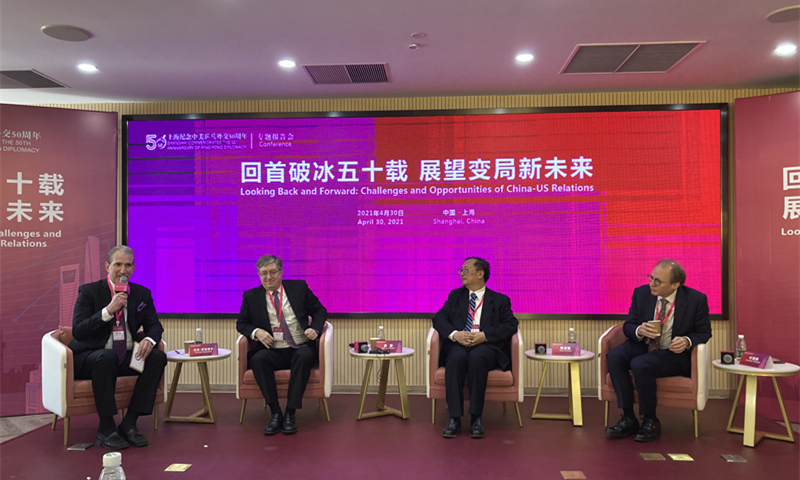Like ping-pong diplomacy, people-to-people connections still promote today’s China-US ties: Chinese and American observers
Like ping-pong diplomacy, people-to-people connections still promote today’s China-US ties: Chinese and American observersLike ping-pong diplomacy, people-to-people connections still promote today’s China-US ties: Chinese and American observers

Participants discuss how China and the US can achieve new breakthroughs in relations via people-to-people exchange at the conference. (photo: Huang Lanlan/GT)
Including climate, education and public health, there are still many fields where China and the US can seek common interests through cooperation, and break the ice for the world's most important bilateral relations amid current uncertainties, noted some Chinese and American politicians, scholars and businessmen at a conference in Shanghai on Friday.With the theme "looking back and forward: challenges and opportunities of China-US relations," the conference was held to mark the 50th anniversary of ping-pong diplomacy, a milestone in the history of China-US relations that once mildly promoted the normalization of bilateral ties and to discuss the possible breakthroughs for today's China and US that are similar to the ping-pong diplomacy of the past.
Climate change is a big opportunity for China and the US to cooperate, said Yang Jiemian, chairman of the Academic Affairs Council at the Shanghai Institute for International Studies, mentioning the joint statement on the climate crisis that the two countries signed earlier this month, which was regarded as a positive signal of the two powerful countries jointly shouldering the interests of the international community.
"Climate change is not only about the climate," Yang told the Global Times. "It has a lot of relevance to political accommodation, science and technological cooperation, as well as how to turn this climate crisis into an opportunity to promote our trade and economic relations."
Education is another major field that China and the US have long been collaborating in, said Jeffrey Lehman, vice-chancellor of NYU (New York University) Shanghai. "We were deeply troubled by the messaging of the last [US] administration, which has done damage to our institutions," he recalled, saying that presidents of American universities had written to the US government to express displeasure.
Fortunately, things have started to improve since the new administration came in, Lehman said. "There might still be a longer visa process for graduate students in certain highly sensitive fields, but I don't think it's a closed door. We should get back to the kind of healthy engagement and partnership between universities that the world needs."
The US announced on Monday that it will ease the travel ban on Chinese students. In Shanghai, the US consulate general is resuming operations to process visas for Chinese students, which will begin next Tuesday, said James Heller, Consul General of the US in Shanghai, who also presented at the conference on Friday.
"Our team is very excited and is working hard to make sure we get them on their way to the United States [and] move them safely and efficiently," Heller told the Global Times. "The US welcomes Chinese students; we know how important they are."
In April 1971, the US table tennis team conducted a visit to China on China's invitation, prior to which the two countries had no official contact at all for more than two decades. The Chinese table tennis delegation visited the US the following year.
Both governments actually stepped back and allowed the people to take the relationship at their own pace in the 1970s, Jan Berris, vice president of the National Committee on US-China Relations, said in a video interview with the Shanghai Institute of American Studies, which was broadcasted at the conference.
"While the two governments enabled it to happen, it was because of the people - the ping-pong players and other athletes…and everybody who was involved in the myriad numbers of exchanges that began in the 70s and grew to such great lengths, that we have the enormous web of deep and broad relationships between Chinese and American people that is very hard to rip apart," Berris remarked.
Unfortunately, the people-to-people exchanges were, to some extent, interrupted for a time by the Trump administration, followed by the COVID-19 pandemic, said Wu Xinbo, dean of the Institute of International Studies at Fudan University in Shanghai.
Now to both China and the US, some of the biggest challenges in improving their relationship is how to control the competitions and avoid possible confrontations as much as possible, Wu said, mentioning the Biden administration's stance in unfolding strategic competition with China.
"Looking back [at] the [first] 100 days of Biden taking office, we are somewhat disappointed with and worried about his policy toward China," Wu told the Global Times on Friday. "Basically, Biden is still on the trajectory of Trump's China policy."
The conference was jointly sponsored by the Shanghai People's Association for Friendship with Foreign Countries, Shanghai Sports Federation, Shanghai University of Sport and the Shanghai Institute of American Studies.

